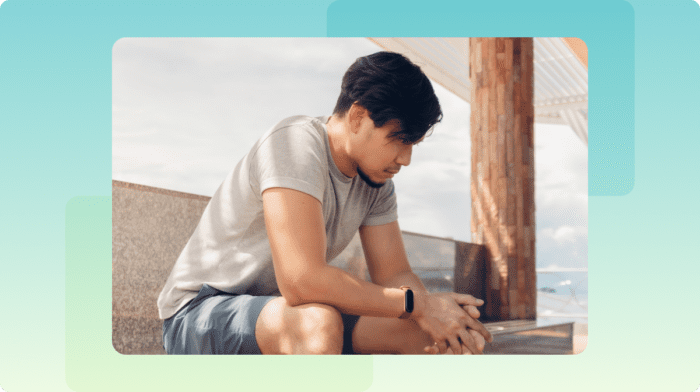If you live with obsessive-compulsive disorder (OCD), you might’ve had moments where it felt like you were fighting an invisible battle, completely on your own. That feeling of loneliness and isolation is a common experience, often caused by OCD’s all-consuming nature.
Intrusive thoughts and compulsions can take up so much time and energy that just making it through the day can feel exhausting. That can make it challenging to stay connected to the people and things you love, fulfill responsibilities at work, or even enjoy simple everyday moments.
It’s important to remember that OCD itself drives this isolation, because when you realize that these feelings aren’t your fault—and that they’re a common part of this condition—you can start finding your way back to feeling like yourself again. With specialized treatment and support, you can learn to manage these feelings, strengthen relationships with others, and experience a richer, more connected life.
Why avoidance can increase loneliness
OCD often convinces people to avoid anything that could trigger anxiety or intrusive thoughts. People, places, activities, objects, or interactions that seem as though they may worsen symptoms can become off limits. At first, this avoidance might provide some short-term feelings of relief. But the more you avoid, the smaller your world can become.
Avoidance can pull you away from friends, family members, hobbies, and even your goals. OCD’s demands often grow over time, which can lead to deeper loneliness and keep you from living the life you want. Depending on someone’s symptom severity, avoidance can even escalate to the point of being housebound.
Avoidance can also hinder the process of getting help through treatment. When people with OCD avoid discussions about their mental health, they can be more likely to feel alienated, alone, hopeless, and stuck in their struggle. Feeling limited in this way may lead to an increased sense of emptiness, feelings of a loss of purposefulness, and even a disconnection from the world around them.
When we avoid potential triggers, it unintentionally makes the OCD cycle even stronger. The short-term relief brought on by avoidance only reinforces the belief that a particular trigger is actually dangerous. That increased sense of danger can lead to increased distress and isolation.
How stigma and misconceptions can play a role
It doesn’t help that OCD is often misunderstood. While we’ve made a lot of progress in raising awareness of how serious and debilitating this condition can be, it’s still frequently stereotyped and oversimplified.
For example, how many times have you heard someone say, “I’m so OCD” as a way to convey their preference for having things be neat or organized? These types of comments and beliefs are all too common, and they fail to validate the highly distressing experiences that those who have OCD deal with every day. This only serves to increase feelings of loneliness.
Because of all this, it can feel “safer” to stay quiet about having OCD—and many people choose to. They may fear harsh judgment, being dismissed as being “attention-seeking,” or having their symptoms misunderstood if they were to seek help or discuss their struggles more openly. But this sense of safety is false, as suffering in silence often leads to deeper loneliness.
It should also be noted that there is a lack of education in society about OCD. Unlike other common mental health conditions, OCD remains vastly under-represented. Individuals experiencing OCD may be unable to locate relatable stories that can offer validation and support, which can leave them feeling even more hopeless and alone. That is why it is critical that more advocacy and reliable education initiatives be made available to the public. It’s imperative that we foster empathy for OCD.
Finding community and connection again
Feeling isolated because of OCD can be painful, but it doesn’t have to stay this way. Proper care and support are out there—and finding people who understand what you’re going through can be life-changing. Therapy with a specialist who deeply understands OCD, support groups, and even connecting with others online can remind you that you’re not alone.
Along with creating a sense of community in your life, it’s also important to carve out time for your personal interests. Reconnecting with hobbies, creative projects, volunteering, or other community activities can be other great ways to rebuild a sense of purpose and belonging. However, remember to set realistic expectations and not jump “all in” too quickly—it may take time to build up to certain activities.
Practicing self-compassion and self-care is also crucial. Try to treat yourself with the same kindness that you so readily give to others. Forgiving yourself, letting go of the past, and focusing on the present can bring about an increased sense of hope and feeling of purpose.
Learning to manage OCD can help you feel less alone
OCD can make the world feel small and isolating, but you are not alone in how you’re feeling or what you’re experiencing. This is something you can overcome. With the right treatment and support, it’s possible to move beyond loneliness and build a life where OCD doesn’t call the shots.
Exposure and response prevention (ERP) therapy is one of the most effective ways to treat OCD. It helps you face your fears gradually, without giving into compulsions—and over time, it can help you feel freer, more connected, and more yourself again.
At NOCD, all of our therapists receive extensive specialized training in ERP and OCD. We also offer dozens of free support groups for our therapy members where you can connect with others who relate. If you’re ready to learn more, our team is here for you. You can book a free 15-minute call with us to find out how ERP therapy can help you take the first step toward a more connected and fulfilling life.

